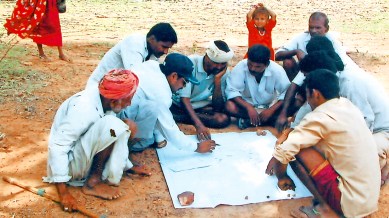Click here to join Express Pune WhatsApp channel and get a curated list of our stories
How this Pune-based organisation is changing lives, one raindrop at a time
This year marks 30 years of WOTR – and the team has many experiences, such as Hande's, to share. WOTR focuses on the rejuvenation of rural ecosystems and building community resilience among some of the state's poorest people to climate change.

The Bhojdari village in Sangamner block of Ahmednagar district has been in a constant tussle for water. Being in the rain-shadow region of the Western Ghats, it receives little rainfall, is prone to droughts and has a large population of some of the most marginalised communities of the country.
Yet, Pushpa Vikas Hande, a local, has told researchers that the village now has “enough left over after using water for crops across two and at times, even three seasons, for domestic use and for their animals.”
monthly limit of free stories.
with an Express account.
Incomes have increased, food shortages greatly reduced, biodiversity has improved and the number of tree species has also increased. This transformation happened over more than two decades and began with the implementation of three projects by the Pune-based Watershed Organisation Trust (WOTR). Hande is a member of the Village Water Management team, started by the organisation.
This year marks 30 years of WOTR – and the team has many experiences, such as Hande’s, to share. WOTR focuses on the rejuvenation of rural ecosystems and building community resilience among some of the state’s poorest people to climate change. Crispino Lobo, one of the founders of WOTR, however, says that the future might prove a steep climb.
“We are facing many challenges. Climate change is number one, followed by a loss of biodiversity and degrading natural resources and environment. Another issue is water. Even a Niti Ayog report says that by 2030, we would be facing a serious crunch and, probably, the demand for water would be more than what is available,” says Lobo.
A radical idea
Rural India has always been at the mercy of the monsoon, with drought-prone regions receiving only 10 to 15 days of harvestable rain in an entire season. “If rainfall is not normal during these days, people begin to worry. Marathwada and the Deccan plateau, particularly, have faced recurrent drought issues. In the 1990s, the late Fr. Hermann Bacher, who lived and worked in India for more than 60 years spending his life organizing rural communities to store rainwater across watersheds and the landscapes they lived in, said unless we carried out watershed development works, we would not be able to address the problems of drought and water scarcity,” says Lobo. It was Bacher who launched the Indo-German Watershed Development Programme to put his radical idea into motion.
Watershed development broadly means capturing rainwater wherever it falls, across the catchments and landscapes and the areas which feed rainwater runoff into streams. The idea is to take systematic and integrated measures to harvest rainwater in-situ by implementing a series of soil and water conservation works such as bunding, contour trenches, compartment bunds, raising forest plantations and growing trees and grasses together with building water impounding structures like nullah bunds, check dams, gabion and similar structures along the water courses. “The idea is if rain water is running off, we slow it down; then we make it walk; and finally, stop it to allow it to percolate underground and recharge the soil and the groundwater table,” says Lobo.
The initiative requires community participation because land in India is privately owned. “But, nature does not respect territorial rights. Water will continue to flow from higher to lower levels. So, any measure to optimise water harvesting has to put people, of all castes and persuasions, at the centre,” says Lobo. The Indo-German Watershed Development Programme was a success and has now grown into a nationally-funded project through the Watershed Development Fund set up by the Government of India at NABARD.
Multi-pronged focus
As of March 2024, WOTR has worked in 7,255 villages in 10 states and trained experts from 63 countries among others. “From 2007, we began noticing that climate change was affecting crop production and lives as the rain cycle was getting impacted. Then, there is the indiscriminate use of synthetic fertilisers that has turned vast tracts of once fertile land unproductive,” says Lobo.
“WOTR has a multi-pronged approach, working on ecosystem regeneration, nature- aligned climate resilient agriculture, water stewardship and governance, providing farmers with customised weather-based advisories, sustainable rural livelihoods, biodiversity conservation, women’s empowerment, nutrition, health and sanitation to address multiple and multi- dimensional challenges facing rural communities,” he says.
One of the important initiatives launched in 2016 was the WOTR Centre for Resilience Studies (W-CReS), which undertakes participatory, transdisciplinary, applied research on topics affecting communities, especially in the context of climate change.
“The idea is to gather ground-level insights and knowledge in order to improve programme design and project implementation; provide evidence and data to policy makers to enable data embedded decision making; and to develop appropriate skilling and capacity initiatives to enable scalar replication of effective development practices,” says Lobo.
“Underlying all these efforts is to accompany people to help themselves out of poverty. As Fr Bacher said, ‘We cannot pull people out of poverty. They alone can and must help themselves; we are just facilitators, helping them to do so,” adds Lobo.
Click here to join Express Pune WhatsApp channel and get a curated list of our stories